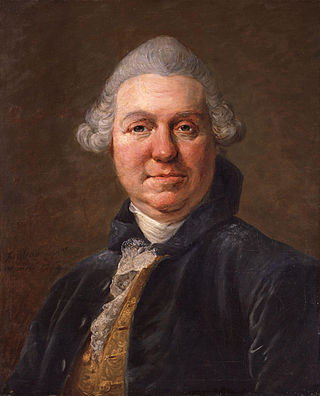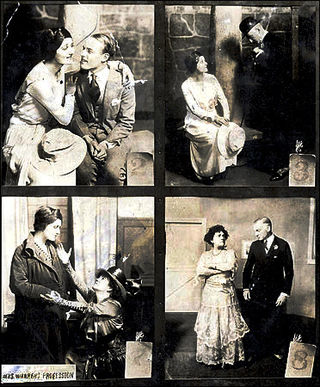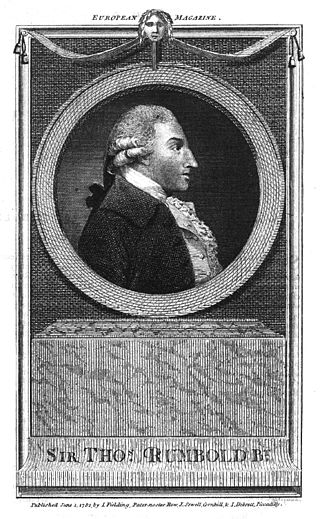Related Research Articles

The East India Company (EIC) was an English, and later British, joint-stock company founded in 1600 and dissolved in 1874. It was formed to trade in the Indian Ocean region, initially with the East Indies, and later with East Asia. The company gained control of large parts of South Asia and colonised parts of Southeast Asia and Hong Kong. At its peak, the company was the largest corporation in the world by various measures and had its own armed forces in the form of the company's three presidency armies, totalling about 260,000 soldiers, twice the size of the British army at the time.

Charles Bannister (1738–1804) was an English actor, comedian and singer.
This article contains information about the literary events and publications of 1772.
This article contains information about the literary events and publications of 1778.

George Colman was an English dramatist and essayist, usually called "the Elder", and sometimes "George the First", to distinguish him from his son, George Colman the Younger. He also owned a theatre.

The Maratha Confederacy, also referred to as the Maratha Empire, was an early modern polity in the Indian subcontinent. It comprised the realms of the Peshwa and four major independent Maratha states often subordinate to the former. It was established in 1674 with the coronation of Shivaji as the Maratha Chhatrapati and recognised by Emperor Bahadur Shah I as a tributary state in 1707 following a prolonged rebellion. Following this, the Marathas continued to recognise the Mughal emperor as their nominal suzerain, similar to other contemporary Indian entities, though in practice, imperial politics at Delhi were largely influenced by the Marathas between 1737 and 1803.

Samuel Foote was a Cornish dramatist, actor and theatre manager. He was known for his comedic acting and writing, and for turning the loss of a leg in a riding accident in 1766 to comedic opportunity.

William Benedict Hamilton-Dalrymple is an India-based Scottish historian and art historian, as well as a curator, broadcaster and critic. He is also one of the co-founders and co-directors of the world's largest writers' festival, the annual Jaipur Literature Festival. He is currently a Visiting Fellow at All Souls College, Oxford.

Mrs. Warren's Profession is a play written by George Bernard Shaw in 1893, and first performed in London in 1902. It is one of the three plays Shaw published as Plays Unpleasant in 1898, alongside The Philanderer and Widowers' Houses. The play is about a former prostitute, now a madam, who attempts to come to terms with her disapproving daughter. It is a problem play, offering social commentary to illustrate the idea that the act of prostitution was not caused by moral failure but by economic necessity. Elements of the play were borrowed from Shaw's 1882 novel Cashel Byron's Profession, about a man who becomes a boxer due to limited employment opportunities.

Sir Thomas Rumbold, 1st Baronet was a British administrator in India and politician who sat in the House of Commons between 1770 and 1790. He served as Governor of Madras from 1777 to 1780. He became infamous for his corruption and, for in effect stealing, the ring of the Nawab of Arcot. He brought home from India 1.5 million pagodas or about £600,000 and was a classic example of a nabob. Attempts were made to investigate the misdemeanour by Henry Dundas but the case did not make much headway.
To Fortune was composed by Samuel Taylor Coleridge in 1793 when he played the lottery in the hope of getting out of debt. The poem was the first work of his to be printed in a major publication.

An Island in the Moon is the name generally assigned to an untitled, unfinished prose satire by William Blake, written in late 1784. Containing early versions of three poems later included in Songs of Innocence (1789) and satirising the "contrived and empty productions of the contemporary culture", An Island demonstrates Blake's increasing dissatisfaction with convention and his developing interest in prophetic modes of expression. Referred to by William Butler Yeats and E. J. Ellis as "Blake's first true symbolic book," it also includes a partial description of Blake's soon-to-be-realised method of illuminated printing. The piece was unpublished during Blake's lifetime, and survives only in a single manuscript copy, residing in the Fitzwilliam Museum, in the University of Cambridge.
Brigadier-General Richard Smith was Commander-in-Chief, India of the East India Company (Bengal).

Richard Barwell was a merchant with the East India Company and amassed one of the largest fortunes in early British India.

A nabob is a conspicuously wealthy man deriving his fortune in the east, especially in India during the 18th century with the privately held East India Company.
Charles Smith was a Scottish artist who worked initially as a painter of portraits but later also painted mythological and whimsical subjects.
Mrs Gardner or Sarah Cheney was a British comedic actress and playwright.

The Lame Lover is a 1770 comedy play by the British writer Samuel Foote. Foote wrote the play while he was recovering from the amputation of his leg, following a riding accident.

Three Weeks after Marriage is a comedy play by the Irish writer Arthur Murphy. An afterpiece, it premiered at the Theatre Royal, Covent Garden in London on 30 March 1776. It was a reworking of an earlier play What We Must All Come To which was staged in 1764, which had a poor reception. The cast included William Thomas Lewis as Sir Charles Racket, John Quick as Drugget, Isabella Mattocks as Lady Racket, Ann Pitt as Mrs Drugget and Jane Green as Dimity. The entire play takes place at a country house about four miles outside London.

The Maid of Bath is a 1771 comedy play by the British actor-manager Samuel Foote. It premiered at the Theatre Royal, Haymarket in London on 26 June 1771. It was inspired by the life of the singer Elizabeth Ann Linley of the Bath-based Linley family. The prologue was written by David Garrick.
References
- ↑ Dalrymple p.224
- ↑ Taylor p.81
- ↑ Alison Oddey, ‘Gardner, Sarah (fl. 1763–1795)’, Oxford Dictionary of National Biography, Oxford University Press, 2004 accessed 22 Dec 2014
- ↑ Nechtman p.136
- ↑ Nechtman p.136
- ↑ Nechtman p.136
- ↑ Dalrymple p.224, 225. Dalrymple uses this extract from Act II of the play, quoted in Marshall, Peter James Problems of Empire: Britain and India, 1757-1813